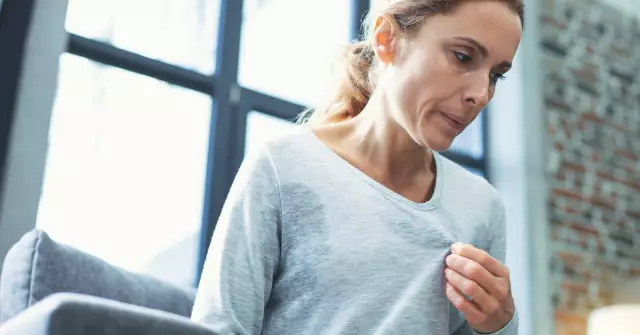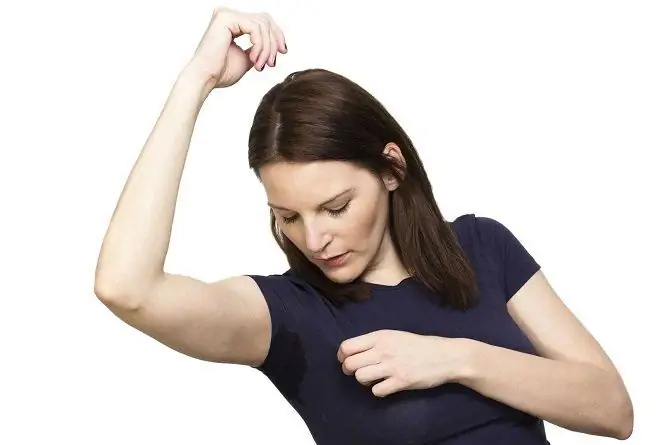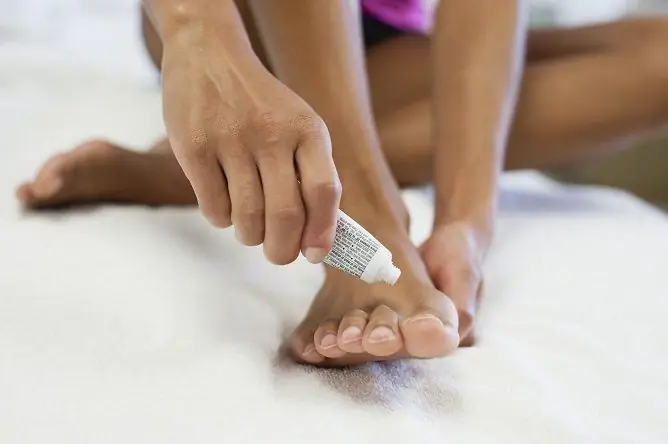- Author Rachel Wainwright [email protected].
- Public 2024-01-15 19:51.
- Last modified 2025-11-02 20:14.
Folk remedies for menopause from hot flashes and sweating
The content of the article:
-
Folk remedies for tides
- Hot flashes: symptom characteristics
- How to remove unpleasant symptoms of menopause
-
Phytoestrogens for menopause: recipes, reviews
- Red clover
- Flax seeds
- Sage
- Hop
- Licorice
- Alfalfa
- Other herbs for menopause
- Video
Menopause is a natural period in a woman's life, which is characterized by a gradual extinction of the production of estrogen by the ovaries. It is impossible to avoid the onset of menopause, but with the help of hormones, diet and medicinal plants, you can fight the manifestations of climacteric syndrome. Folk remedies for menopause from hot flashes and sweating are of several types - herbs and products containing phytoestrogens, as well as plants with a sedative, tonic effect.

Medicinal herbs can help deal with unpleasant symptoms of menopause
Folk remedies for tides
Menopause is characterized by a decrease in the production of female sex hormones by the ovaries. Estrogen deficiency leads to the development of various unpleasant conditions: hot flashes, dryness in the vagina, tearfulness and mood swings. Treatment can consist of both substitution therapy and the use of auxiliary agents that facilitate the course of menopause.
Hot flashes: symptom characteristics
Hot flashes are the most common symptom of autonomic disorders in menopause. Their occurrence is associated with a violation of thermoregulation as a result of estrogen deficiency. Hot flashes are characterized by a feeling of intense heat in the upper body. The fever is accompanied by increased sweating, less often - reddening of the skin, and then replaced by chills. The cyclical appearance of hot flashes is characteristic, the frequency of occurrence can be different, from 2 to 30 times a day.
How to remove unpleasant symptoms of menopause
The most effective method of treating menopause is hormone replacement therapy - the systemic use of estrogen and gestagen preparations, which allows you to eliminate the deficiency of sex hormones. For the same purpose, you can take phytoestrogens - plant estrogens that are found in some foods and herbal plants.
Phytoestrogens for menopause: recipes, reviews
Taking plant estrogens helps to replenish the estrogen deficiency in the body during menopause. This helps to reduce its early manifestations, including hot flashes. To date, several classes of phytoestrogens have been identified, the main of which are isoflavonoids: isoflavones, genistein, daidzein, coumestans. Isoflavonoids are able to bind to estrogen receptors, due to which the therapeutic effect is carried out. Plant sources of estrogen are flax seeds, clover, sage, hops, licorice, and alfalfa. On their basis, decoctions and infusions for internal use can be prepared.
Red clover
Red clover contains isoflavones and coumestans, due to which it can be used to treat hypoestrogenic conditions in women. Almost all parts of the plant are used for treatment: inflorescences, leaves, stems and root. Decoctions, infusions and tinctures for internal use are prepared from red clover. The recipe for a medicinal decoction:
- take 2 tbsp. l. clover leaves;
- fill them with 2 cups of boiling water;
- boil in a water bath for 15 minutes;
- strain and let cool.
You need to drink the broth in 100 ml 3 times a day 30 minutes before meals. The course of treatment is long - from a month or more. The effect lasts exactly as long as the treatment lasts.
From the inflorescences of red clover, you can prepare an alcoholic tincture. This will require 25 g of dried clover flowers and 150 ml of alcohol. Flowers must be filled with alcohol and left for 10 days in a dark place. You need to take the remedy for 1 tsp. per day, after dissolving the alcoholic tincture in boiled water.

Red clover helps with hypoestrogenic conditions
Flax seeds
Flax is a plant-based source of estrogen. Flax seeds contain phytoestrogens lignans, which are converted in the intestine into enterolactone and enterodiol. In addition, flax seeds have a pronounced enveloping effect, which has a beneficial effect on the condition of the digestive tract.
To get rid of hot flashes and excessive sweating during menopause, a decoction of flax seeds will help. Recipe:
- take 2 tbsp. l. flax seeds and rinse them;
- pour 200 ml of boiling water;
- simmer over low heat for 15 minutes;
- let cool and strain.
You need to take a decoction of 50 ml 4 times a day 30 minutes before meals. The course of treatment is 2 weeks.

Flax seeds are a popular folk remedy that also helps with menopause
Sage
Another source of phytoestrogens is sage. In addition, sage leaves contain vitamins A, C, E, K. To treat menopause, you can use tea and a decoction of sage leaves. To make tea, you need 1 tsp. dry leaves pour 1 cup boiling water, let it brew for 10 minutes. Tea can be drunk in intervals between meals, for the whole day no more than 1 liter. The course of treatment is long, with good tolerance, sage broth can be taken throughout the entire menopause.

Sage contains phytoestrogens
Hop
Hops contain a powerful phytoestrogen, 8-prenylnaringenin, which can help relieve hot flashes and sweating during menopause. On the basis of hop cones, you can prepare an alcoholic tincture:
- take 75 g of hop cones;
- pour 400 ml of vodka;
- the mixture must be closed, left in a dark, cool place;
- insist for 10 days;
- strain, squeeze the cake out of the cones.
It is necessary to take the tincture 2 times a day - in the morning on an empty stomach and before bedtime. For 1 reception, you need to dilute 5 drops of alcohol tincture in 1 tbsp. l. water. The first signs of improvement are usually seen 1-2 weeks after starting treatment. Duration of admission is from 2 months or more.

Hop cone tincture will help with hot flashes
Licorice
Licorice root is used not only to treat coughs, but also to alleviate the course of menopause. Licorice contains the isoflavin glabridin, which binds to estrogen receptors. On the basis of licorice root, you can prepare decoctions and tinctures.
| Licorice root recipe | How to cook | Mode of application |
| Decoction | 1 tsp pour 200 ml of hot water of dry chopped licorice root, boil in a water bath for 30 minutes. Then cool and strain the broth. | Take 1 tbsp. l. 3 times a day 1 hour after meals. |
| Tincture | 1 tsp chopped dry licorice root pour 150 ml of vodka. Leave the solution in a dark place, shaking occasionally. Strain after 10 days. | Take 2 times a day, morning and evening, 15 drops. |

Licorice root is used for the preparation of traditional medicines that help with menopause
Alfalfa
Alfalfa contains the phytoestrogen coumestrol and formononetin. Like other phytoestrogens, alfalfa helps to relieve menopause by binding to estrogen receptors. Alfalfa herb is mainly used in folk medicine. How to prepare the tincture:
- take 1 tbsp. l. dry alfalfa herb;
- pour 150 ml of vodka;
- insist in a dark place for 14 days;
- strain.
Tincture is taken 10 drops 3 times a day 30 minutes before meals. The course of treatment is 1 month.

Alfalfa tincture relieves unpleasant symptoms of menopause
Other herbs for menopause
For the treatment of menopause, not only phytoestrogens are used, but also plants that have a calming, antidepressant, tonic effect. Dill, chamomile, St. John's wort, lemon balm, hawthorn, oregano are used. You can prepare folk remedies from each plant separately or use fees.
| Medicinal plant | General provisions, recipe | How to take, course of treatment |
| Dill |
Dill has a mild diuretic, tonic and hypnotic effect. Also, dill will help with urogenital disorders. Women in menopause are advised to take an infusion of dill seeds. Recipe: · Take 1 tbsp. l. dill seeds; · Pour a glass of boiling water; · Leave for 30 minutes; · Strain, let cool. |
Take 200 ml orally in the morning on an empty stomach. The course of treatment is 14 days. |
| Chamomile | Chamomile has a sedative effect, normalizes mood, and eliminates sleep problems. To make tea, you need 1 tsp. pour 200 ml of boiling water over chamomile flowers, let it brew for 15 minutes. | It is recommended to drink 200 ml of tea in the evening. |
| St. John's wort | St. John's wort is useful for psychoemotional disorders. For treatment, alcohol tincture is used. To prepare the tincture, you need 20 g of St. John's wort, pour 100 ml of vodka, let it brew for 7 days, strain. | Take 30 drops 3 times a day 30 minutes before meals. |
| Hawthorn | Hawthorn in gynecology is used as a remedy for the course of menopause. Tea is made from leaves and fruits, infusion is made from flowers. To prepare the infusion, you will need 2 tbsp. l. pour 400 ml of boiling water over dry hawthorn flowers, leave for 30 minutes. | The infusion is taken in 100 ml 4 times a day before meals, tea - during the day. |
Video
We offer for viewing a video on the topic of the article.

Anna Kozlova Medical journalist About the author
Education: Rostov State Medical University, specialty "General Medicine".
Found a mistake in the text? Select it and press Ctrl + Enter.






